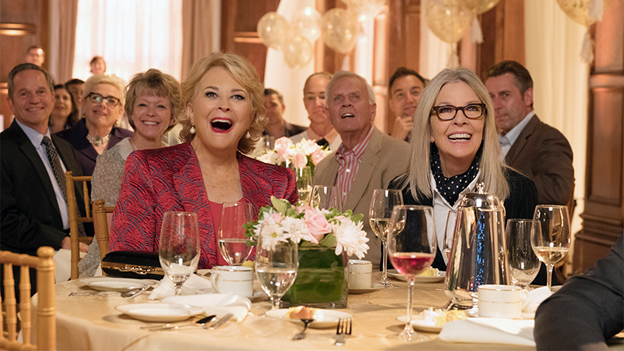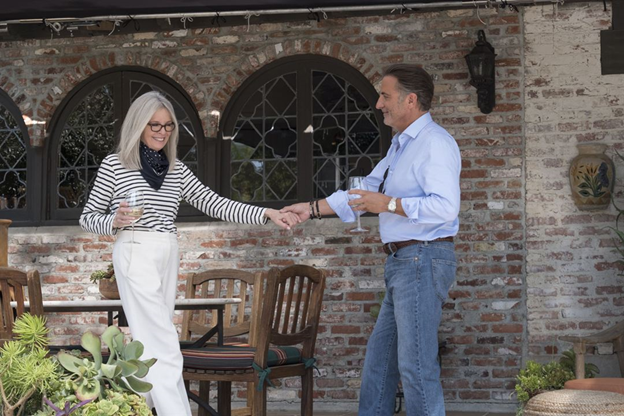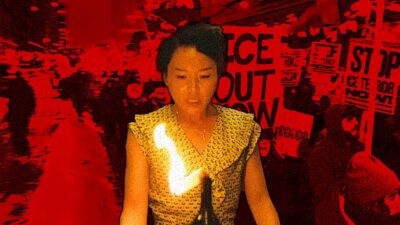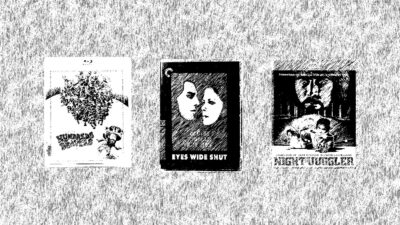This article previously appeared on Crossfader
Consider the grandma. And the grandpa for that matter. Any elder in your life who has lived and lives and is filtered through the prism of time to feel out of touch, uninformed, or worse, apathetic to the world as it exists today. BOOK CLUB is for them. As a sex-romp, “nice” comedy and venue for Jane Fonda and Diane Keaton to remind you that they’re talented actors, BOOK CLUB is a joy. Its infinite kitchens, giant wine glasses, and gigantic spreads of charcuterie are capitalist decadence, sure, but also a perfect venue for the women of this film to flex their wit, plumb their emotions, and have their worlds broadened by an unsuspecting source, the FIFTY SHADES trilogy of erotic novels.
The women of BOOK CLUB, Diane (Diane Keaton), Vivian (Jane Fonda), Sharon (Candice Bergen), and Carol (Mary Steenburgen) met in college, formed a book club, and through their companionship with each other pursued successful careers and more or less achieved their dreams. The opening of the film finds them in transition, Diane’s children are pressuring her to move to an assisted living facility after the death of her husband, Vivian won’t admit to herself that she wants a long term romantic relationship, and Sharon and Carol struggle to spice up their love lives. The answer to all of this of course is FIFTY SHADES OF GREY (and some bizarre Bumble product placement). Reading the novel sends the women on paths to change their lives, refocusing them on the personal and romantic parts of living they’ve neglected or left behind. This takes the form of dance lessons, dalliances with wealthy pilots, splashing around in fountains, and Bumble dates with some of America’s treasured character actors. Fun stuff for fun, extremely wealthy, powerful older women. Women who remind me of my own grandmothers in some ways and in others, not at all.

Bergen and Keaton appreciating the horror of creation
When I think of my own grandmothers, one an immigrant from South America, the other, a refugee of the Mormon Church, transplanted in California to raise their families in the pursuit of what could be reductively called the American Dream, I think of a kind of perseverance. A commitment to survival for survival’s sake in a time when it was a lot easier for that to become success and plenty. In a post-Trump, post-MeToo world it’s a lot harder to remember that. That they worked hard for what they have. That their justice, ethics, and morals were held to a different standard. That the society they grew up in and helped shape changed the world so rapidly that it quite literally pulled the rug out from under them. Films like BOOK CLUB are ostensibly about how even in old age, people are still people. People who make mistakes, learn, and love.
The problem is, the world changing around you is not an excuse for selfish behavior. And the world having new moral standards is proof that things can get better and closer to righteousness, not that change has run amok and left you in the dust. That’s what’s perhaps strangest about BOOK CLUB, the film that unites a powerhouse of acting talent into an approachable, often weird narrative that serves product placement just as much as it does the sex lives of women over the age of 60. For it’s 104-minute runtime it never stops to consider the lives outside of its surprisingly myopic viewpoint. That for as overbearing and surface-level the children of its protagonists are, they are living in a world that their parents destroyed. That their parents and their parents’ parents allowed to become more dangerous, more prejudiced, and polluted in the pursuit of the lives they were told they deserved.

Keaton and García tango-ing on the skeleton of America
Perhaps this is too dark a read, too serious for a movie that is ultimately a fun bundle of rom-com tropes as performed by your favorite actors of yesteryear. A film that humbly asks you to imagine how elders feel and proudly reveals that, yes, they feel just like you. But I’d like to underline a commonality between film’s like BOOK CLUB or THE INTERN, or, in even more of a stretch, EAT, PRAY, LOVE. The people who are allowed to go on fun “romps,” to put everything aside and really focus on love and life, are people who are either wealthy, powerful, or some kind of combination of the two. Jane Fonda’s character is a powerful business woman who runs a popular Los Angeles hotel, Candice Bergen’s character is a judge on the Los Angeles Superior Court, Mary Steenburgen’s character is the head chef of a fancy restaurant. These are characters with tremendous access to resources (especially if it’s wine and cheese) who find themselves frustrated with the state of the world and how they’re viewed by their family and friends. A world they may have made and certainly help maintain. They decide they deserve more and they take it.
Which is all to say that BOOK CLUB is a fun film. Perhaps not as fun as GIRL’S TRIP, but warm and chuckle-inducing nonetheless. Because it describes the pleasure of access and the true fantasy of getting everything you want even if it’s right before it’s too late, it also boldly represents the sexuality of older women, a topic that can often be shied away from. But its goal of promoting sympathy for elders is the harder line to connect. One that would require much more wine and a willingness to engage with both the old AND young characters of the film. Something the film has no interest in doing, but maybe should have.















Comments